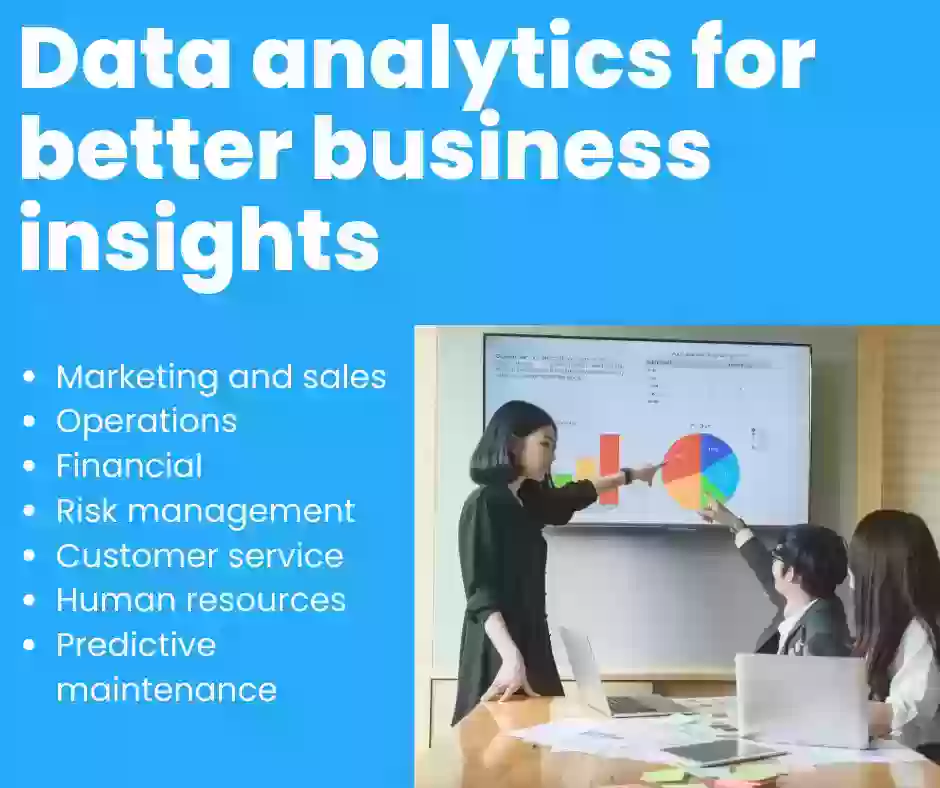To find relevant information, draw conclusions, and assist decision-making, data analysis entails inspecting, cleaning, manipulating, and modelling data. Data analytics can be utilised in a company setting to enhance a variety of functions, including marketing, finance, and operations. Data analytics can be used by businesses to better understand customer behaviour, enhance pricing and promotions, find untapped markets, and increase supply chain effectiveness. Additionally, corporate performance, including financial performance and key performance indicators, can be tracked and improved using data analytics. Data visualisation, statistical analysis, machine learning, and big data technologies are some of the instruments and technologies utilised in data analytics.
What is Data Analytics?
Examining, filtering, manipulating, and modelling data to identify pertinent information, reach conclusions, and support decision-making is the process of data analytics. Numerous techniques and tools are used in this area, including big data technologies, machine learning, data visualisation, and statistical analysis. Data analytics can be useful in many fields, including business, finance, healthcare, and research. It plays a crucial role in taking action and making smart decisions for the benefit of a business.
Why Data analytics?
Data analytics are crucial because they give firms insights into their data, enabling them to make wise decisions. They can use this to spot patterns, trends, and connections that might not be obvious initially.
Data analysis allows businesses to:
By discovering bottlenecks and inefficiencies in their operations, organisations can increase efficiency and production.
By locating fresh prospects and consumer groups, increase revenue.
Reduce expenses by finding opportunities for cost reduction.
Identifying consumer wants and preferences will increase customer satisfaction.
Providing precise and timely information to assist corporate decisions can improve decision-making.
Dangers can be reduced by recognising potential risks and proactively addressing them.
Making data-driven decisions quicker and more precisely than rivals will give you a competitive edge.
How is Data analytics advantageous in business?
Businesses can benefit from data analysis in several ways, including:
- Better decision-making: By analysing data, firms can discover information that can guide operational and strategic choices.
- Enhanced efficiency: Data analysis can assist companies in locating inefficiencies and streamlining procedures, which saves money and boosts production.
- Better customer understanding: A greater understanding of the target market may be attained by businesses through the analysis of customer data, which enables them to better adapt their goods and services to suit the needs of the market.
- Enhanced competitiveness: Businesses can get an advantage over rivals by utilising data analysis to gather insights and make wise decisions.
- Finding new opportunities: By analysing data, firms can find opportunities and trends they may not have previously known about.
Uses of Data analytics for better business insights
Data analytics can be used to learn more about a variety of business performances and operations. Several instances include:
- Marketing and sales: By analysing customer data, firms can find patterns and trends that can be leveraged to enhance their marketing and sales strategies. It can help identify potential customers by studying and analysing their data.
- Operations: By using data analytics to find inefficiencies and bottlenecks in production processes, cost savings and increased productivity may result.
- Financial: Data analytics can be used to enhance financial budgeting and forecasts, as well as pinpoint opportunities for cost-cutting and revenue expansion. It can help predict different patterns and also protect businesses from fraudulent activities.
- Risk Management: Data analytics can be used to recognise and evaluate business hazards, enabling proactive risk management.
- Customer service: Businesses may enhance customer service and pinpoint areas for development by analysing customer interactions and feedback. Companies can use customers' data to better understand their needs and get deep insight into their behaviour.
- Human Resources: Patterns and trends in employee performance, turnover, and other HR-related variables can be found using data analytics. This can help make better decisions in the future and also help make better hiring decisions by analysing past recruitment data.
- Predictive maintenance: It can help organisations plan maintenance schedules more effectively and minimise downtime in the manufacturing and logistics sectors by predicting when a machine or piece of equipment is likely to break.
Overall, data analytics can be used to gain a deeper understanding of the business and make more informed decisions, ultimately leading to improved performance and growth.
Why is Data analytics important in businesses?
The potential of data analytics to assist firms in identifying areas for improvement is one of its main advantages. For instance, a company can determine which products are selling well and which are not by looking at sales statistics. The decisions made regarding which items to keep or drop, as well as how to deploy marketing resources, can then be based on this information.
Data analytics may also help companies better understand their customers, which is another advantage. Businesses can find demographics, spending patterns, and other details that can guide their marketing and sales activities by studying consumer data. For instance, if a company discovers that a significant portion of its clients is situated in a particular region, it may decide to spend money on marketing there.
By uncovering inefficiencies and wasteful areas, data analytics can assist firms in improving their operations. For instance, a company can spot operational bottlenecks and address them by looking at production statistics. Increased productivity and lower expenses may result from this.
To use data analytics effectively, one must have a solid understanding of both the data being analysed and the business goals it is intended to support. It is also necessary to have the right tools and materials, such as data visualisation software and a team of data analysts.
Data analytics is a potent instrument that may give companies insightful information about their consumers and operations. Businesses can better their operations and boost their bottom line by analysing data to find patterns and trends and make wise decisions.
If you want to learn or know more about discovering useful and effective insights from your data to help grow your business, then visit our Data Science Course today!

Comments